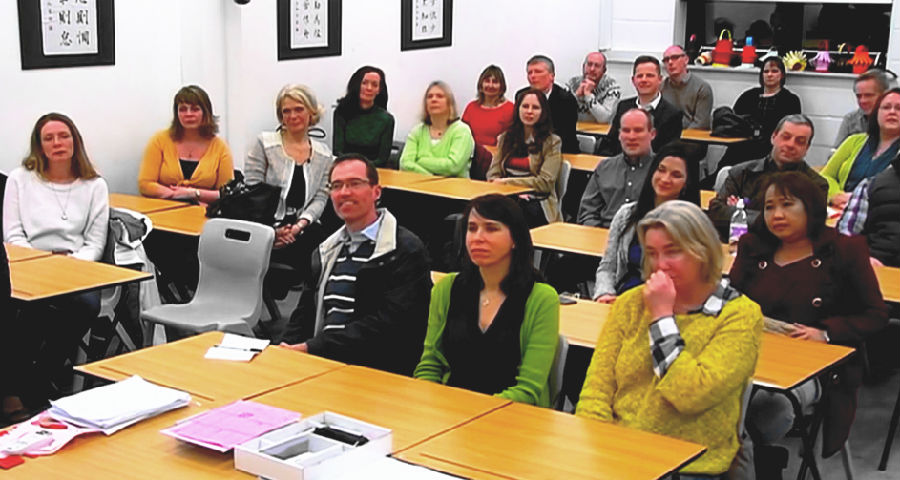Hello. Good evening. I'm very glad to see you here.
晚上好。我非常高興在這里見(jiàn)到你們
You know, the children, just of this age, they are not that serious, but I think...
你們知道,這個(gè)年齡段的孩子,他們并不太嚴(yán)肅,但我認(rèn)為
And yes, we have problems too, you know?
是的,我們也有問(wèn)題要面對(duì)
When they sit in a big classroom with 50 students,
當(dāng)他們坐在一個(gè)五十人的大教室里
it's very easy for them to get chatty or something.
他們很容易就會(huì)開(kāi)始講話
And what is very important is that we have a final test next week,
然而非常重要的是下一周我們有期末考試
so we hope that you can help to push our students a little bit,
所以我希望你們能多鞭策一下自己的孩子
so that they can do well in the examination, in the final test.
從而讓他們能在考試中,尤其是期末考試中取得優(yōu)異的成績(jī)
So, I really need your support.
因此,我非常需要在座各位的協(xié)助
Let's push them to be quiet and concentrated, so that they can focus on the study.
讓我們一起引導(dǎo)他們變得安靜而專注,從而可以全身心地投入學(xué)習(xí)中
Thank you very much.
謝謝你們的到來(lái)
And I really hope to get your support here.
并且我衷心希望得到你們的的幫助
OK, thank you very much.
謝謝你們

I find the difference between the students here and in China...
我發(fā)現(xiàn)這兒的學(xué)生和中國(guó)的學(xué)生有很大的不同...
In China, sometimes I don't need to push my students,
在中國(guó),有時(shí)我不用鞭策我的學(xué)生學(xué)習(xí)
because the reality of the society will push them.
因?yàn)樯鐣?huì)現(xiàn)狀會(huì)代我為之
But here, you've got a very good social insurance system.
但在英國(guó),一個(gè)擁有良好社保系統(tǒng)的國(guó)家
You know, even if you don't have a job, the government will give you money.
即便你沒(méi)有工作,政府也會(huì)為你提供可觀的津貼
But in China, sorry. No money, no job. No money, no food.
可是在中國(guó),不好意思。沒(méi)有錢,沒(méi)有工作,沒(méi)有錢,就沒(méi)有食物
And one day, your children will maybe face the competition with the Chinese students.
而在將來(lái)某一天,您的孩子也許會(huì)和中國(guó)學(xué)生展開(kāi)競(jìng)爭(zhēng)
OK, I don't mean your children... You know,Your children are not lazy.
我的意思不是你們的孩子.. 其實(shí),你們的孩子并不懶惰
They are also intelligent.
他們同樣十分聰慧
In fact, they are very clever and lovely students.
事實(shí)上,他們都是聰明且可愛(ài)的學(xué)生
But just the big environment a lot of them feel too comfort.
但在這樣的大環(huán)境使得他們中的大多數(shù)人安于現(xiàn)狀
They don't feel any dangers.
不能做到居安思危
One day, when they need to face the challenges from the outside, what should they do?
終有一天,當(dāng)他們必須面對(duì)外界挑戰(zhàn)的時(shí)候,他們?cè)撛趺醋?/div>
What can they do?
他們能做什么
The challenge we will face, our children will face, sooner or later.
這些挑戰(zhàn),我們將要面對(duì),我們的孩子們將要面對(duì),是遲早的事
OK, thank you.
好的,謝謝你們



